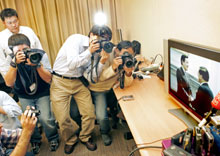Taiwan's pro- "independence" leader Chen Shui-bian yesterday rejected an
opposition call for a resumption of talks with the Chinese mainland based on the
"1992 consensus" on the one-China principle.

Local journalists
watch and photograph a closed circuit television as Taiwan's "president
Chen" Shui-bian (R) greets main opposition Nationalist Party leader Ma
Ying-jeou at the "Presidential Office" in Taipei April 3, 2006.
[Reuters] |
During his two-hour meeting with opposition Kuomintang (KMT) Chairman Ma
Ying-jeou in Taipei, Chen did little to conceal his determination to pursue
"independence" for the island.
"It would be problematic to regard this (the 1992 consensus), which does not
exist at all, as the basis of talks," Chen said, adding that he would do nothing
to compromise Taiwan's "sovereignty."
"There should not be the one-China principle."
The "1992 consensus" refers to an informal agreement, reached orally between
Taiwan and the mainland, that both sides should adhere to the one-China
principle, which holds that both Taiwan and the mainland belong to one and the
same China.
But Chen and his Democratic Progressive Party (DPP) have denied the existence
of the consensus since he took power in May 2000.
The meeting between Chen and Ma, broadcast live on local news channels, was
their first since Ma became the KMT chairman last year.
But their lengthy discussion brought about little agreement between the two
leaders on a wide range of issues, including cross-Straits ties, arms purchases
and "constitutional" change.
During the meeting, Ma expressed his hope that Taiwan be a peace-maker rather
than a troublemaker in the Asia-Pacific region.
He said there should be reconciliation and co-operation across the Taiwan
Straits.
Chen, however, poured cold water on Ma's idea of signing a peace treaty that
would ensure peace in the Taiwan Straits for 30 to 50 years.
He also reiterated his determination to forge ahead with the so-called
"constitutional re-engineering" project to write a new "constitution" for the
island in 2006 and enact the document in 2008.
Ma, seen by many as a "presidential" front-runner in 2008, questioned Chen's
wisdom of scrapping the island's "national unification council" and its
guidelines on eventual reunification with the mainland.
Beijing has described Chen's move as a dangerous step towards "Taiwan
independence."
Ma had requested the meeting with Chen after returning from a high-profile
trip to the United States last month.
In an unusually warm reception, he met US Deputy Secretary of State Robert
Zoellick, the highest level contact between Taiwan and the United States in
years.
The United States was angered by Chen's decision last month to disband the
council, a move interpreted by Washington as an unnecessary provocation of
Beijing.
(China Daily 04/04/2006 page1)